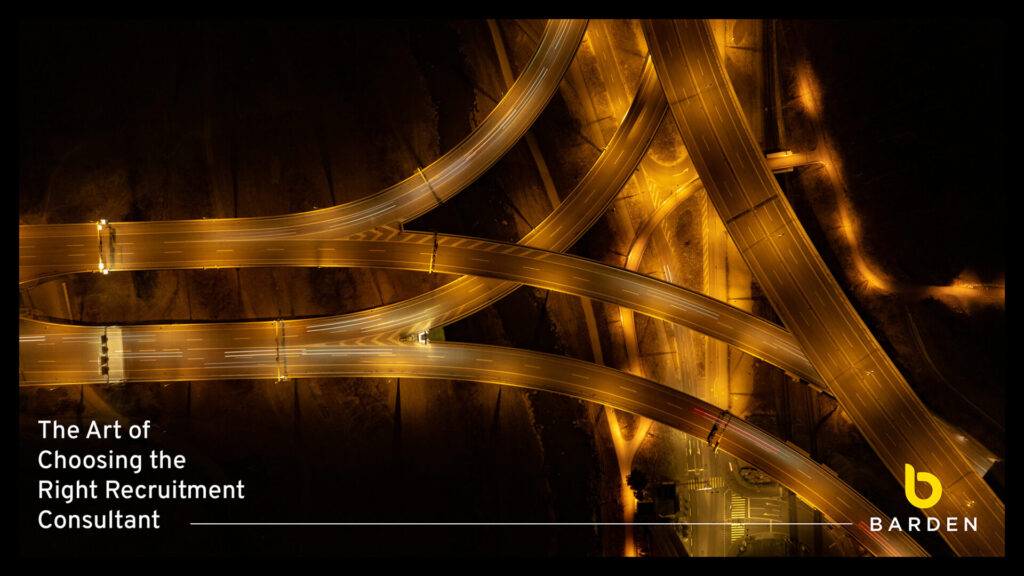There are different types of recruitment consultant, and you may even deal directly with a hiring manager. Whoever you deal with, here are a few basics you should know.
A good recruitment consultant (or talent advisor as we say in Barden) can be a great asset as you work through the many stages of your career. Identifying a great consultant amid the mass of recruitment firms can be tricky, however, and requires both patience and persistence.
While Google or LinkedIn will present you with an almost endless list of firms and contacts, the best way to identify a good recruitment consultant is word-of-mouth referrals. So talk to respected colleagues or acquaintances about their experience of the world of recruitment and ask for recommendations.
The Initial Consultation
You will ideally engage with two or three respected recruitment consultants and spend some time explaining your background and ambitions. Prior to your initial consultation, however, you should consider what you do and do not want in a prospective role, and be able to communicate that clearly to the consultant. If you’ve followed the steps in this publication, you should be clear on your ideal role and where you are willing to work (in geographical terms).
Salary should also be discussed at the initial consultation, and it’s vital that you’re both honest and realistic about your expectations. Salary will change over time and trying to make great one-off strides in this area is unrealistic in most cases. Also, salary should be a secondary consideration as your focus ought to be on the overall remuneration package. If a role is on the table, consider the monetary and non-monetary benefits and counter that with the cost of your commute in terms of both cost and length/distance. Also, is international travel in your comfort zone? If not, that could help the consultant refine future searches.
It’s important to note at this point that recruitment consultants generally handle hundreds of CVs each week, so you shouldn’t expect to be their sole focus. Instead, establish clear expectations and acknowledge that the process is a shared responsibility.
The Trusted Advisor Vs The Commodity Recruiter
Not all recruitment consultants are made equal. There can be a huge disparity in how consultants interact with people and just a handful will take the advisory approach while the remainder will be largely focused on filling vacancies.
If your consultant is more advisory in nature, she or he will want to hear about your career preferences and expectations. Trust will usually build naturally in this open environment and such consultants can be invaluable as they will give you advice and insights – not just jobs – and could become lifelong assets as you develop your career and build your own teams.
Where the consultant is more transactional in nature, you will need to request all the right information about the role. It would also be wise to consult your network for information on the company’s culture and the team in which the role sits. There are also some things to avoid – don’t be coerced into applying for a role you’re not interested in, and don’t feel obliged to accept an offer straight away. Your end goal is to secure the best outcome for you – not for them.
Different consultant types have different agendas, but knowing this can help you better manage the job application process and maintain a large degree of control.
Dealing Direct
On occasion, you may find yourself dealing directly with a hiring manager in a company. Once you enter a direct recruitment process with an organisation, you must bear in mind that the organisation is duty-bound to look after its own best interests, so it’s important that you seek out the most objective insights and advice possible.
Invite a current or former employee for coffee and ask if they would recommend the organisation, what they enjoyed or disliked about their time there, the reality about career progression and so on. But beware of disgruntled employees! You can mitigate this risk by talking to multiple sources with links to the organisation, as the more people you speak to, the better (and more balanced) your understanding will be. It might sound like a lot of work but when you consider that you will spend roughly 90,000 hours at work in your lifetime, it’s a worthwhile investment.
Before we wrap up there are a few other things you really should know
- A recruiter should never send your CV to a company without permission, and you should never give permission without first understanding the context of the role and responsibilities.
- Never permit your CV to be submitted to the same company from multiple sources. The process can get very messy for the recruitment consultant and hiring manager if you don’t abide by this rule, and it won’t reflect well on you either.
- You should keep a list of who sent what to whom and when. Take responsibility for following up with consultants for feedback and updates.
- Good recruiters can be a great asset in your job search. Not-so-good recruiters can be too, provided you get access to the roles you want. Just proceed with caution and choose your allies wisely.
Want more insights and advice from one of our talent advisors?
No problem. Just drop us a line today on hello@barden.ie and we will take it from there. Simple.


 Jump Back
Jump Back

